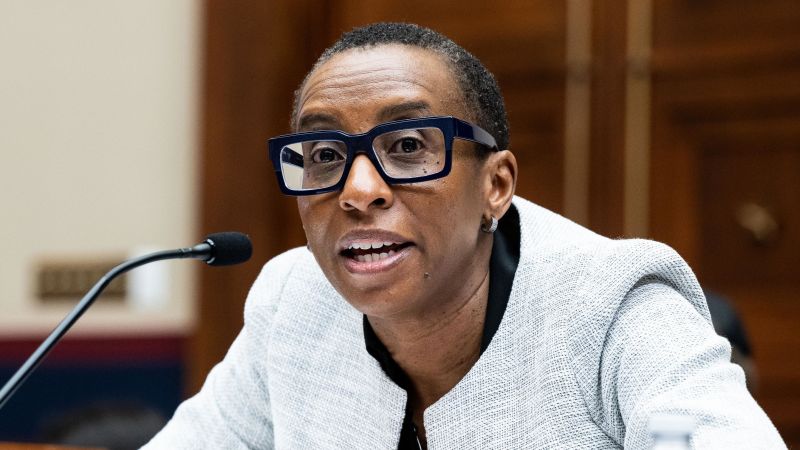Now that Liz Magill has stepped down as president of the University of Pennsylvania, the spotlight has turned to her counterpart from Harvard University, Claudine Gay.
“One down. Two to go,” Republican Rep. Elise Stefanik of New York wrote on X, formerly known as Twitter, with the “two” being a reference to Gay and MIT President Sally Kornbluth. “In the case of @Harvard, President Gay was asked by me 17x whether calling for the genocide of Jews violates Harvard’s code of conduct. She spoke her truth 17x. And the world heard.”
Stefanik serves on the House Committee on Education and the Workforce, which called on Magill, Gay, and Kornbluth last Tuesday to testify about their responses to alleged incidents of antisemitism on their campuses in the wake of the Israel-Hamas war.
All three gave widely criticized testimony, in which they failed to condemn calls for the genocide of Jews as explicitly against campus harassment and bullying codes. On Friday, a bipartisan group of lawmakers sent a letter to the governing boards of Harvard, Penn, and MIT urging them to remove their university leaders.
Gay has since apologized for her remarks, “I am sorry,” she said in an interview with The Harvard Crimson on Thursday. “Words matter.”
“I got caught up in what had become at that point, an extended, combative exchange about policies and procedures,” Gay told the student newspaper. “What I should have had the presence of mind to do in that moment was return to my guiding truth, which is that calls for violence against our Jewish community — threats to our Jewish students — have no place at Harvard, and will never go unchallenged.”
Harvard is one of several academic institutions to come under fire in recent months over alleged antisemitism on campuses following the terror attacks by Hamas on October 7 and Israel’s subsequent strikes on Gaza. Harvard is also among 14 colleges under investigation by the Department of Education since the attacks “for discrimination involving shared ancestry” an umbrella term that covers both Islamophobia and antisemitism.
Gay, a political scientist whose work focuses on intersections of politics and race, was inaugurated as Harvard’s 30th president in July after serving as dean of the school’s Faculty of Arts and Sciences.
Unlike Gay, Penn’s Magill was under fire for months prior to her resignation. Donors had been calling for Magill’s resignation since September, when the university allowed speakers that Penn’s administration acknowledged had a history of making antisemitic remarks to participate in the “Palestine Writes Literature Festival” on campus. Those existing tensions were further inflamed once the current Israel-Hamas war began.
Gay has also been vocal in her acknowledgement of Jewish students’ concerns.
On October 7, a coalition of student groups released a statement placing the blame for Hamas’ attacks on Israel’s government. The letter drew sweeping condemnation from business leaders and alumni, who called for the students whose groups signed the statement to be blacklisted. A spokesperson for the coalition later wrote in a statement that the group “staunchly opposes violence against civilians — Palestinian, Israeli, or other.”
Three days after the coalition posted its letter, Gay released a statement condemning the “terrorist atrocities perpetrated by Hamas” and affirming that “no student group — not even 30 student groups — speaks for Harvard University or its leadership.”
In a speech at Harvard’s Jewish student organization in late October, Gay announced that she had assembled an advisory group of “faculty, staff, alumni, and religious leaders from the Jewish community” who “will help us to think expansively and concretely about all the ways that antisemitism shows up on our campus and in our campus culture.”
That has not made Gay less susceptible to criticism, but her willingness to take accountability in the face of criticism may be the determining factor in whether she ultimately steps down.
On Sunday, the Harvard Crimson cited “a source close to the governing boards” who said that Harvard’s board is meeting on campus for a regularly scheduled meeting. CNN has reached out to Harvard for comment.
Business leaders and alumni have criticized Gay and her counterparts over their perceived inaction in combatting antisemitism on their campuses. Bill Ackman, a billionaire hedge fund CEO, has been among Gay’s most vocal critics. Following her testimony before Congress, he demanded that Gay, along with Magill and Kornbluth, “resign in disgrace,” citing disgust with their testimony.
Ackman, a Harvard graduate, has also questioned Gay’s academic integrity and values, posting on social media content that implies Gay, who is the first Black woman to lead Harvard, was hired to fulfill diversity metrics.
But criticism from Harvard’s community has largely framed discrimination on campus as a systemic issue, not a moral failing on Gay’s part. In the statement announcing his resignation from Harvard’s antisemitism advisory group last week following Gay’s disastrous testimony, Rabbi David Wolpe said that combatting the combination of ideologies at Harvard that frame Jews as oppressors while “belittling and denying the Jewish experience … is the work of more than a committee or a single university.”
“It is not going to be changed by hiring or firing a single person,” he wrote, after emphasizing that he believes Gay is “both a kind and thoughtful person.”
Alumni donors — more than 1,800 of whom signed an open letter to Gay and Dean of Harvard College Rakesh Khurana — have called for concrete reforms to support Jews on campus and have warned that they would withdraw their donations if those steps were not taken.
Read the full article here




